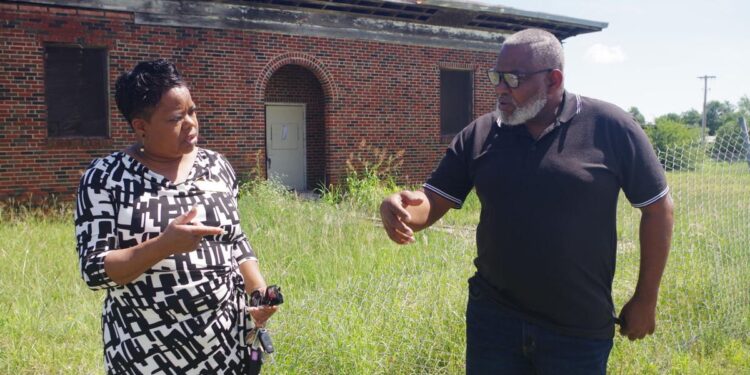Former students still have a lot of good memories about Dunbar School.
That’s why Sherene L. Williams admits she was teary-eyed as she cast her vote as the Ward 7 City Council representative to keep the school on the D&D list. That unanimous council decision means the City of Lawton will proceed with plans to demolish the deteriorating structure.
While the building, which was in a predominate African-American neighborhood, hasn’t been a school since 1974, it continues to evoke warm feelings for those who were students, parents, teachers, administrators and staff. Often, a single person has dual connections because Dunbar School was a focal point for the community and a multi-generational experience for many families.
That was true for the Williams family. Closure meant Sherene had to complete her final two years of elementary school at Crosby Park Elementary. Her older brother Ricky B. Williams had completed his years there; he was a junior high freshman when Dunbar closed. The younger Williams were following in the footsteps of their elders. Sherene said her mother, the late Mrs. Pearlean Williams-Lawrence, was a Dunbar student, as were her aunts and uncles. Cousins also attended the school; in fact, one of her cousins was married to Lemuel Harkey, Dunbar’s last principal.
“I felt bad about my siblings not having the opportunity,” Ricky said about the fact he completed elementary school there and they didn’t, adding Dunbar had a camaraderie for students they didn’t have in their new schools.
Sherene said Dunbar was important to the neighborhood for multiple reasons. It was predominantly African-American while also serving as a community school where students walked to class each morning.
“Therefore, we got early morning exercise and physical exercise at school,” she said, adding most of the families in the neighborhood knew each other, and so did students, faculty and staff.
Ricky said Dunbar provided a foundation that followed students into adulthood.
“We didn’t realize at the time the impact it made on us,” he said.
Ricky said Dunbar’s closure didn’t have an immediate effect on him because his focus was on being a freshman. But, he watched others and realized how the closure impacted the camaraderie that stretched from student to teacher to principal to school cook. Many teachers at Dunbar lived in the nearby neighborhood, meaning they were friends as well as teachers (meaning they also knew how to find your parents). Their families lived in the neighborhood and their children played with students. Often, adults had been classmates.
“It was a good way to keep us in check,” Ricky said, remembering his childhood as a rambunctious boy before he got serious about his schooling (Sherene was always studious, he said, with a sideways look at his smiling sister).
Ricky said one of the primary things about Dunbar was family.
“Teachers knew our parents. Some were aunts and uncles to us,” he said. “They had a vested interest in our up-bringing. It was more than a physical education. Spirituality was part of it.”
Even when school wasn’t in session, Dunbar was the center of the community. Ricky said the school provided “self-contained entertainment.” For example, adults showed movies on Friday nights, admitting students for a quarter each and serving popcorn.
“I saw ‘Frankenstein’ and ‘Dracula’,” he said, remembering some of his favorite movies.
The memories of movie popcorn, in turn, evokes memories of good school lunches.
“The cooks cooked the way we liked to eat it,” Ricky said, of meals that he and Sherene remember including corn muffins and homemade dinner rolls.
“Dunbar was special for our neighborhood. It was almost an extension of home,” Ricky said, adding the education he received there “prepared me for what was to come.”
Part of that preparation was mentors, men in the school he could look up to and men who made it clear there were no barriers you couldn’t overcome.
“We had living proof of it in front of us,” Ricky said of a predominantly African-American staff who were working with a pre-dominantly African-American study body.
That, in turn, propelled students where they needed to go in life. But, the school also had students and teachers of other races, and that, in turn, helped teach students how to treat one another, Sherene said.
It’s among many reason closure affected the community so deeply.
“It almost felt like a death,” Sherene said.
Want to reach a local audience and grow your business?
Our website is the perfect platform to connect with engaged readers in your local area.
Whether you're looking for banner ads, sponsored content, or custom promotions, we can tailor a package to meet your needs.
Contact us today to learn more about advertising opportunities!
CONTACT US NOW



